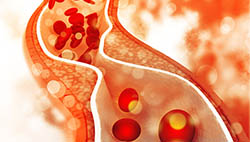Treat Avascular Necrosis at MidAmerica’s Palos Hills & Mokena Locations
Avascular necrosis, or osteonecrosis, is a condition where bone tissue dies from lack of blood supply. Without enough blood, small breaks begin to form in the bone and potentially cause disintegration. While anyone can develop this condition, it typically occurs in middle-aged adults between the ages of thirty and sixty. If treated early enough at MidAmerica’s Palos Hills or Mokena clinics, further bone damage can usually be minimized through home treatment and therapy; surgery is a last resort. (Mayo Clinic)

Causes & Symptoms
When the blood supply is interrupted or reduced en route to a bone, avascular necrosis occurs. Blood flow may be decreased by a few different factors, including but not limited to:
- Dislocated joints
- Radiation
- Fat deposits in the blood stream
- Long-term use of high-dose steroids
- Excessive alcohol consumption
- Various diseases, such as diabetes, lupus, and sickle cell anemia (Mayo Clinic),(Mayo Clinic)
For many people living with avascular necrosis, the cause of their weakened blood flow has not been diagnosed.

Symptoms of avascular necrosis may not be apparent in the condition’s earliest stages. Typically affecting high impact joint areas such as the hip, knees, hands, shoulders, and feet, the affected joint (or joints, since the condition may occur reciprocally to both sides of the body) may cause moderate to severe pain when weight is applied to it, continuing to worsen if left untreated. (Mayo Clinic)
Diagnosis
In order to properly diagnose avascular necrosis, your doctor will typically perform a physical exam. By pressing and moving the joints in question around, the doctor is able to check for tenderness and a decreased range in motion. Avascular necrosis is also often diagnosed through imaging tests such as X-rays, MRIs, bone scans, and CT scans. (Mayo Clinic)
Common Misconceptions
Despite its daunting name, diagnosing and treating avascular necrosis doesn’t have to be scary. Here are some common myths debunked:
Myth #1: There is no way to prevent avascular necrosis
Avascular necrosis can be prevented from practicing healthy habits including:
- Limiting alcohol intake
- Monitoring cholesterol levels
- Minimizing use of high-dose steroids (Mayo Clinic)
Myth #2: Avascular necrosis ultimately requires surgery
There are a variety of ways to treat avascular necrosis before a doctor may recommend surgery. Consider the following home remedies while under the care of your physician: Mayo Clinic
- Physical Therapy
- Rest
- Anti-inflammatory medications that do NOT contain steroids, such as ibuprofen
- Cholesterol-reducing medications
- Osteoporosis medication
- Blood thinners
- Electrode stimulation (Mayo Clinic)
Surgical Treatment
In cases where avascular necrosis has advanced too far to be treated exclusively through home treatments, surgery might be in the patient’s best interest. (Mayo Clinic)
Joint replacement is an option when home remedies have failed. At MidAmerica’s Palos Hills and Mokena locations, our Total Joint Clinic is here to help. Dr. Sarkis M. Bedikian specializes in adult reconstruction, hip replacements, and high-tech knee replacements. In order to ensure the fullest recovery for our patients, we also recommend physical therapy.

Post Surgery
The postoperative process at MidAmerica Orthopaedics Palos Hills and Mokena clinics consists of a variety of stretches and exercises guided by our physical therapists. These procedures give patients the therapy needed to improve their physical quality of life as they return to their everyday activities.
At MidAmerica Orthopaedics, we have your best interests in mind. Whether your joint pain is caused by avascular necrosis or another condition, we have a variety of knowledgeable experts that are ready to assist you. To learn more about MidAmerica Orthopaedics and the different treatment options available to you, visit our website.
To schedule an appointment with MidAmerica Orthopaedics physician Dr. Sarkis M. Bedikian, call (708) 237-7200 or click here. We also proudly serve patients from Chicago, Oak Lawn, Orland Park and New Lenox.

